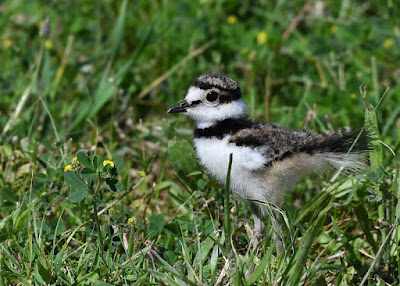 |
| Western Kingbird / Photo by Kari Cieszkiewicz/USFWS |
- As shorebirds migrate south, they depend on being able to forage at key stopover sites, like the Bay of Fundy.
- A single Red-billed Tropicbird has spent the summer at Seal Island National Wildlife Refuge in Maine every summer since 2005 despite the lack of other tropicbirds in the area.
- Burned forests, when left alone, can benefit certain birds like Black-backed and Lewis's Woodpeckers.
- City Wildlife has recommendations for keeping migratory birds safe on their journey.
- Atlantic Puffins are protected in the northeastern US by three key environmental laws. Those laws and others are under political attack.
- Various studies have shown that birds in urban contexts change their songs to be heard over the ambient noise. A new study suggests that birds around airports sing at lower pitches because of hearing loss. Birds around airports also tend to be more aggressive.
- Captive-bred Helmeted Honeyeater hybrids were released into the wild to keep an endangered subspecies from dying out due to inbreeding.
- A Mexican environmentalist who studied and protected macaws was found murdered. Murders of environmentalists have increased worldwide in recent years.
- A new study attempted to estimate the number of birds killed illegally in the Middle East.
- Last year the RSPB documented 87 incidents of raptor persecution, but only one resulted in a conviction.
- Raptor persecution is a problem in Australia as well, where Wedge-tailed Eagles are among the targets.
- A new study found that Wekas can disperse seeds as far as doves despite their flightlessness. However they become less effective at dispersal when they live near humans.
- British birders may have recorded the country's first ever Brown Booby this month.
- Corvid Research: Dumpster diving is giving crows higher cholesterol—but does it matter?
- Avithera: Musk Duck displaying
- Avian Hybrids: More than meets the eye: Scientists discover several cryptic storm-petrel species
- AOS News: Seeking Mixed-Species Flocks in China’s Misty Mountains
- awkward botany: Seed Dispersal by Way of Tree Climbing Goats
- A new report calls for a ban on fishing Shortfin Mako sharks, which are declining from overfishing.
- Sea Otters are dying from Toxoplasma infections transmitted by domestic cats. Infections could be reduced by keeping cats indoors and not maintaining feral cat colonies.
- Insect declines reported in Puerto Rico might not be the result of climate change.
- Ground-nesting bees may be exposed to lethal doses of pesticides in the soil near agricultural areas.
- The rare Union Island Gecko, which is threatened by the pet trade, was given the highest listing under CITES.
- A newly-discovered species of gall mite may change the way gall mites are classified.
- Invasive Zebra Mussels have spread to lakes in Texas.
- The arrival of beavers increases the biodiversity in wetlands through their engineering work.
- Increased park visitation is stressing Elk in Colorado's Rocky Mountains.
- The president has promised pardons to subordinates if they break laws to build his border wall.
- The administration plans to gut methane regulations, despite objections from fossil fuel companies and the effect of methane on the climate.
- The administration is also pushing to expand logging in Tongass National Forest, which is home to the world's largest intact temperate rainforest.
- Meanwhile the DNC reiterated its ban on 2020 presidential candidates participating in a climate debate.
- The cruise ship industry has its share of environmental problems, from greenhouse gases and water pollution to striking marine mammals.
- Evidence shows that the fires in the Brazilian Amazon are linked to deliberate deforestation.







